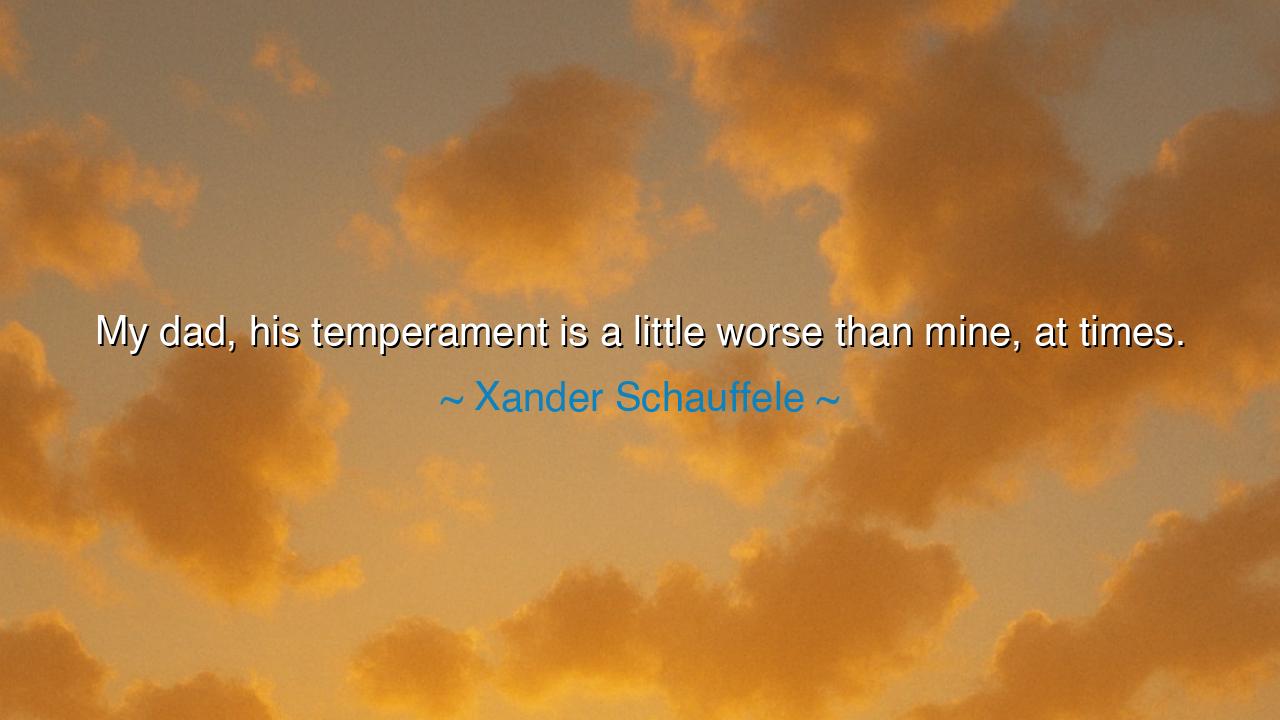
My dad, his temperament is a little worse than mine, at times.






Hearken, O children of reflection, and listen to the words of Xander Schauffele: “My dad, his temperament is a little worse than mine, at times.” Here lies a meditation upon the eternal truths of inheritance, human nature, and the bonds between parent and child. From the dawn of civilization, men have pondered the ways in which character, temperament, and spirit pass through generations—not as a mere shadow, but as a living force, shaping relationships, deeds, and destinies. To observe one’s own temperament reflected, and sometimes magnified, in a parent is to encounter both challenge and wisdom.
Consider the nature of temperament itself. It is the fire within, the measure of passion, patience, and resilience, the force that shapes reactions and decisions. Xander’s words acknowledge a truth known since antiquity: that family ties bind us not only in love but in shared traits, some noble, some volatile. A father’s temperament may inspire, challenge, or test a child, revealing the power of inherited tendencies, yet also the possibility of mastering and transforming them. To recognize this inheritance is the first step toward understanding oneself and one’s lineage.
History provides countless illustrations of this interplay. Alexander the Great, son of King Philip II of Macedon, inherited not only his father’s throne but his fiery temperament and ambitious spirit. In the crucible of their relationship, Alexander learned both the advantages of boldness and the perils of unchecked pride. Likewise, Xander Schauffele, observing the temper of his father, confronts the mirrored qualities within himself, recognizing both the gift and the challenge of inherited disposition. This is the timeless dance of legacy: the child sees the parent, and in seeing, sees oneself.
The observation also speaks to acceptance and awareness. To note that a parent’s temperament may be “worse” than one’s own is not merely a critique, but a reflection of understanding, humility, and compassion. It is the acknowledgment that no human is perfect, that traits can be both burden and blessing, and that the relationship between parent and child is a living lesson in patience, empathy, and self-mastery. Even when faced with intensity, volatility, or impatience, one can choose response over reaction, learning from example and counter-example alike.
Consider the lives of artists, warriors, and philosophers who wrestled with familial temperament. Socrates, who contended with the stern and practical dispositions of his elders, learned to temper his own passions with reflection and discourse. The interplay of inherited character and personal cultivation became the forge in which virtue was shaped. So too in modern life: awareness of a parent’s temperament provides the mirror in which we confront our own tendencies, enabling growth, self-control, and wisdom.
From this reflection emerges practical guidance. Observe the traits inherited from those who raised you. Learn the strengths they impart, but also the pitfalls to avoid. Temper your passions with reason, respond with mindfulness, and cultivate empathy for the human flaws mirrored in family. By seeing the fire within your parent, you may learn to control the flame within yourself, transforming inherited tendencies into instruments of purpose and virtue.
Let the generations remember this eternal truth: temperament is both inheritance and opportunity. It can inflame, it can inspire, it can challenge, yet it also offers a pathway to self-knowledge and mastery. Xander Schauffele’s insight teaches that to observe and understand the character of one’s forebears is to engage in the timeless work of reflection, growth, and harmony.
Therefore, O seeker of wisdom, contemplate the temperaments that course through your lineage. Embrace awareness, practice patience, and cultivate self-mastery. In doing so, you honor both your inheritance and your potential, transforming inherited fire into disciplined strength, and ensuring that the lessons of the past illuminate the path of your own life with clarity, courage, and enduring insight.






AAdministratorAdministrator
Welcome, honored guests. Please leave a comment, we will respond soon